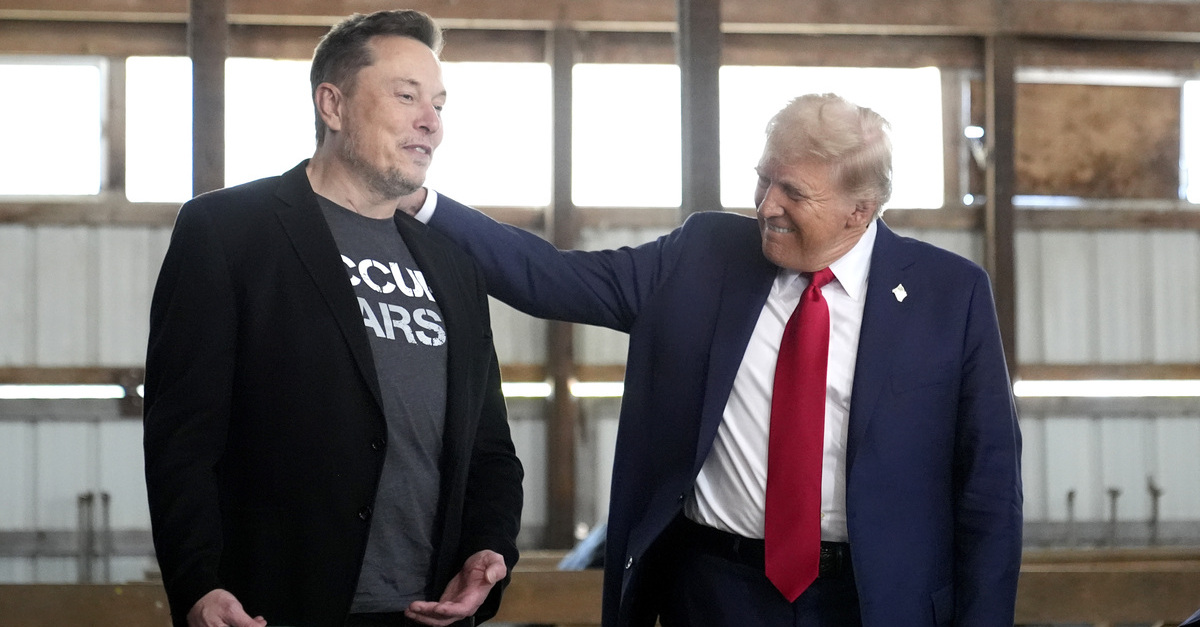
Elon Musk, left, and President Donald Trump attend a campaign event at the Butler Farm Show, Saturday, Oct. 5, 2024, in Butler, Pa. (AP Photo/Alex Brandon).
The Trump administration’s Treasury Department is breaking multiple federal laws by allowing tech billionaire Elon Musk and members of the newly formed Department of Government Efficiency (DOGE) to access the sensitive personal data and financial information of private citizens, a new federal lawsuit claims.
The complaint was filed Monday in U.S. District Court in Washington, D.C., by Public Citizen Litigation Group on behalf of two labor unions and an retired workers’ advocacy group. The action names as defendants the U.S. Treasury Department, Treasury Secretary Scott Bessent, and the Bureau of the Fiscal Service.
“It is disgraceful that the Trump administration has allowed unelected billionaires and their lackeys unfettered access to the personal and financial information of Americans,” said Everett Kelley, the national president for the American Federation of Government Employees, one of the plaintiffs in the case. “Together, we can stop this violation of American citizens’ privacy.”
The suit alleges that in Bessent’s first week leading the treasury, he broke multiple laws aimed at protecting the private information of Americans from improper disclosure and misuse, particularly those laws prohibiting disclosure of the information to individuals with a “lawful and legitimate need” for it. Bessent is also accused of taking punitive measures against career employees who attempted to protect the information from being improperly accessed.
Plaintiffs allege that Musk and other DOGE employees had been trying to gain access to the data “for some time,” but were repeatedly rebuffed by the unnamed civil servant who was then the head of the Bureau of the Fiscal Service. One of Bessent’s first acts as treasury secretary, the complaint says, was to place that civil servant on leave and “grant DOGE-affiliated individuals full access to the Bureau’s data and the computer systems that house them.”
From the filing:
He did so without making any public announcement, providing any legal justification or explanation for his decision, or undertaking the process required by law for altering the agency’s disclosure policies. The scale of the intrusion into individuals’ privacy is massive and unprecedented. Millions of people cannot avoid engaging in financial transactions with the federal government and, therefore, cannot avoid having their sensitive personal and financial information maintained in government records. Secretary Bessent’s action granting DOGE-affiliated individuals full, continuous, and ongoing access to that information for an unspecified period of time means that retirees, taxpayers, federal employees, companies, and other individuals from all walks of life have no assurance that their information will receive the protection that federal law affords. And because Defendants’ actions and decisions are shrouded in secrecy, individuals will not have even basic information about what personal or financial information that Defendants are sharing with outside parties or how their information is being used.
The career public servant was David Lebryk, who retired on Friday after being placed on administrative leave, according to a report from The New York Times.
The complaint goes on to claim that in allowing DOGE employees to access Americans’ information, the administration is violating The Privacy Act of 1974 as well as the Internal Revenue Code.
“People who must share information with the federal government should not be forced to share information with Elon Musk or his ‘DOGE,’” the complaint states. “And federal law says they do not have to.”
The plaintiffs asked the court to issue an order declaring that giving Musk and DOGE access to Bureau records and personal information about taxpayers is unlawful and to grant injunctive relief to protect the privacy of individuals whose information is contained within the system of records.
Despite its title, DOGE is not an actual federal government department. Rather, it is a “temporary organization” formed by President Donald Trump via executive order tasked with “modernizing federal technology and software to maximize efficiency and productivity” by reducing the number of federal workers and cutting spending. The organization is established under the Executive Office of the President and its administrator reports to the White House chief of staff.
Trump has not announced a DOGE administrator or revealed publicly whether Must is a government employee or if he remains a private citizen.
Democratic lawmakers have also sounded the alarm over Musk’s sudden access to otherwise confidential information. Sen. Ron Wyden, a Democrat from Washington state who is the ranking member of the Committee on Finance, on Friday penned a letter to Bessent emphasizing that the Bureau’s funding systems distribute more than a billion payments annually, including to “competitors of Musk-owned companies.”
“To put it bluntly, these payment systems simply cannot fail, and any politically-motivated meddling in them risks severe damage to our country and the economy,” Wyden wrote. “I am deeply concerned that following the federal grant and loan freeze earlier this week, these officials associated with Musk may have intended to access these payment systems to illegally withhold payments to any number of programs. I can think of no good reason why political operators who have demonstrated a blatant disregard for the law would need access to these sensitive, mission-critical systems.”







